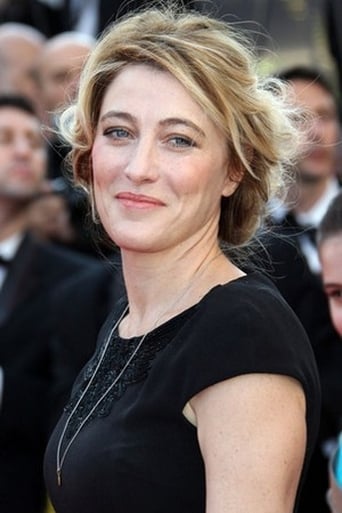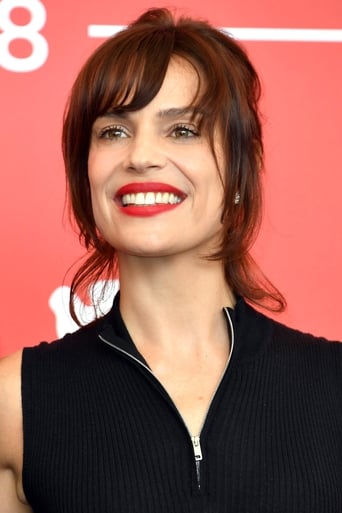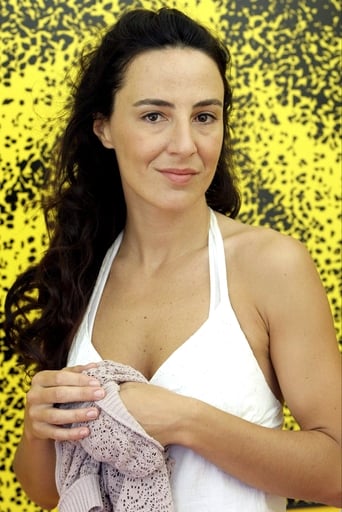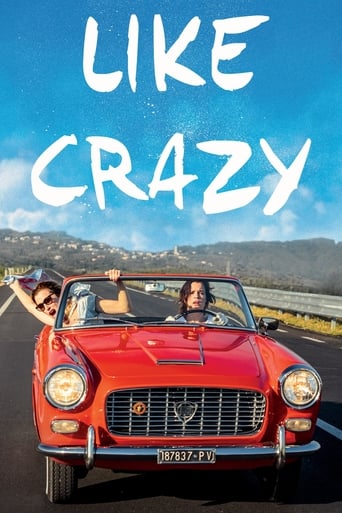
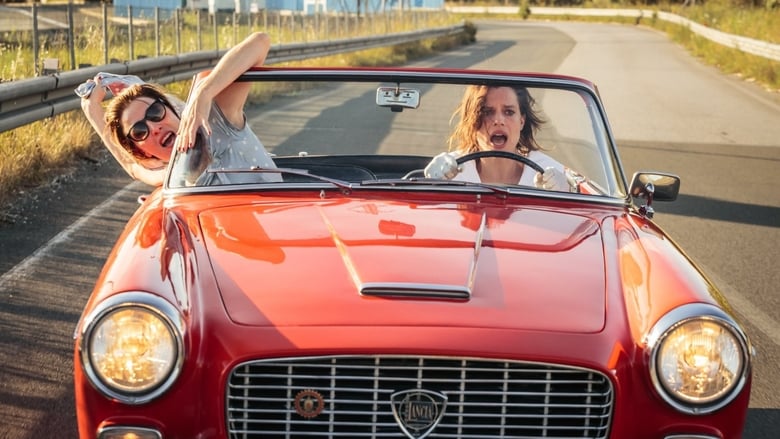
Like Crazy (2017)
Two mental patients with opposite personalities ditch their Tuscan hospital and embark on an unpredictable exploration of the real world.
Watch Trailer
Cast


Reviews
At first you wonder what a woman like Beatrice Morandelli Valdirana is doing in the Villa Biondi, an institution for women with mental health problems in the Tuscan countryside. She claims to be a Countess, rich, well-connected and knowledgeable. A little bit of a busybody maybe, talkative, inquisitive and demanding but clearly intelligent. It's not long however before you're wondering what on earth they are thinking letting her out to do some part-time work at a plant nursery. Are they mad?The difference is that Beatrice seems to have hit it off with a new 'inmate', Donatella Morelli, who has been brought in after a suicide attempt. Unlike Beatrice, Donatella is silent, withdrawn and nervous, and has no social connections and only one number on her phone. When the mini bus picking them up from the nursery is late one day, the two women decide to make their own way back; the long way, with a few amusing diversions along the way.With two inmates from a mental health institution on the loose, you might think La Pazza Gioia (Like Crazy) is going to be something along the lines of 'The Dream Team' meets 'Thelma and Louise', and indeed the film plays up the crazy angle for all it's worth, with plenty of broad humour to be had in their encounters along the road and their chases from the authorities. Principally however, La Pazza Gioia is an actor's game, and Paolo Virzi is working with two of the best here, giving them great material to work with.Beatrice is a gift of a role for Valeria Bruni Tedeschi, who has a successful career as an actor in France and Italy and has drawn on her own aristocratic background as the writer/director of 'Il est plus facile pour un chameau...' and 'Un château en Italie'. Give her broad and she'll expand to fill the role, demonstrating the full range of her abilities from comedy to drama, from melodrama to more subtle exchanges and sensitivities. The dynamic is stretched further in the contrasting role offered to Micaela Ramazzotti as Donatella, who is searching for her son who has been taken away from her and into care. This gives the film a little more dramatic poignancy than the premise might suggest.More then than just being a buddy comedy or a vehicle for two great actors, it's the fact that there are two great performers in these roles that gives the film the necessary balance between comedy and more serious matters that are raised. La Pazza Gioia looks at some of the problems faced by women and how those troubles are not recognised or taken seriously in the no-nonsense modern world. It's enough to drive anyone crazy.
The original Italian title translates as The Crazy One, which initiates the first question: to which of the two runaway psychiatric institute inmates does the title refer? Is it the yapping name-dropping aristocratic blonde beauty Beatrice or the vulnerable punk with a past Donatella?As is common in the Cuckoo's Nest genre, the narrative reverses our expectations when we find characters outside the institution are at least as loony as those within. Here Beatrice's ex- husband lawyer and Donatella's mother match the heroines in eccentricity and perversity. At first reading the film sensibly treats the illnesses of depression and manic exhilaration with empathy. On that theme alone the film stands solid and humane.But it also operates on two broader levels. One is the celebration of a free individualism against restrictive conventions of behaviour. In their separate worlds both heroines violate what's expected of them. Beatrice insists on living large and free, snooping through forbidden files, playing doctor, luxuriating in her ex- husband's verboten estate, deluding herself that her ruinous pimp loves her. Donatella only wants to keep her baby son, or to have his other-familied father see him, or to give the baby a day of adventure outside The Home. Both women are charged with madness for their emotional needs. Their freedom threatens others. When Donatella meets her little son on the beach she is finally allowed to express herself. The boy's adoptive parents check their fears and let her frolic with him for a while. Their liberalism is quickly denoted by their second adoptive child, a little black girl. When Donatella and her son swim underwater together she can wash away their earlier submersion. Then in despair she tried to drown them together. With this new contentment Donatella on her own returns to the home to be cured. An institution is a dramatic setting for this theme. Its values are control, suppression of the wild and spontaneous, conformity. The home here is rather easy, given the cinematic tradition. There's no Nurse Ratchit and the physical restraint and electroshock are in outside institutions, not here. Indeed the happy ending has both women return for treatment instead of being dispatched to harsher alternatives. In the end, untrammelled individualism proves destructive. Social order requires restraint, which sometimes needs to be initiated from without if it's not working within. In the Italian context the film plays that tension out on the political level. Italians constantly face the electoral choice between liberty and repression, especially in the context of its Fascist past. The relatively gentle institution here represents a government of order that stops short of that historic extreme, but it is still a system of restraint. In this respect the film addresses the political tension beyond Italy, across Europe and into America. Broadly, today the repressive Right promotes the conformism of nationalism and white superiority, driving the modern experiment of liberalism to retreat.
One of the key players of current Italian cinema, Paolo Virzì's newest offering LIKE CRAZY brings audience to the sun-drenched Toscana, where nestles a home for the mentally unstable (a picturesque mise-en-scène peppered with creditable employees and patients), there we meet Beatrice (Tedeschi), a motormouth screwball who can compulsively babble on and on as long as she can find an audience, and Donatella (Ramazzotti, Ms. Virzì in real life), a diffident introvert masked by her tattoo-embroidered body and punk appearance, who is ailed by depression and a tendency of violence. Beatrice befriends the newly arrived Donatella, who becomes the newest recipient of her predominantly one-sided pattering, but Beatrice also reciprocally brings a pint of energy into Donatella's colorless life, for the clinical aspect, they transmit salutary influences on each other, a defining vindication of the existence of such communal facilities. One day, during a field day, when their pick-up is late, Beatrice impulsively dashes to a bus with Donatella tagging along, against others' opposition, hence the duo embarks on a journey fueled by spontaneous decisions and devil-might-care drollness, if not wholly realistic, a similar mode of Ridley Scott's THELMA AND LOUSIE (1991) except that there will be no place for body count and radical feminist manifesto to temper Virzì's well wrought combo of farce and drama. The onus of farcical bombast is aptly falls upon the shoulders of Ms. Tedeschi, and it is pretty much up her alley to conjure up an inexorably flamboyant character takes no prisoners in her maniacal loquacity, verbally challenges, needles, assaults everyone she meets or around her, which sometimes feels too specific for an Italian-speaking context, her "crazyness" is unequivocally the driven force of the duo's on-the-run caper, but at moments when sensibility and sagacity is required, e.g. during the conversation with the foster parents of Donatella's son, she can also function as a qualified interlocutor who is not self-absorbed and eloquent enough to make her points clear. Yes, Donatella has a toddler son which she has to forsake due to her unwell conditions, and it is through Donatella's back-story, where clichéd scenario of a woman buffeted by unworthy parents, atrocious sleazes and a traumatic severance between a mother and her son hits all the notes, life renders her completely helpless and disillusioned, but even so, miraculously, buoyed up by Beatrice's undimmed vivacity and "craziness", eventually Donatello procures a glimpse of hope in the faintly mawkish encounter with her unwitting tot, to predictably affix a non-confrontational ending to this ostensibly rebellious yarn against bureaucracy, authority, patriarchy and the Establishment. Both actresses register impressive performances albeit the script isn't always coruscating with golden ideas, Tedeschi dominates in her unfettered oomph and gumption while Ramazzoti diametrically sears in her distressed transmogrification, but it is the former's all-out flair entrances audience, not just being a brazen laughing-stock, underneath Beatrice's grandiloquent veneer, there lies a dysfunctional human being dragged into neurosis and illusion through her own dopiness and those inimical exterior forces, from this regard, both are nevertheless victims on similar grounds, but ultimately, it seems, Virzì consciously cops out to unleash its sociological critique and instead, sends a more anodyne message of a circular conclusion without disturbing the status quo.
From the writer, director of 'Human Capital' fame. This is a road adventure that's filled with some fun, thrills and emotions. The story of two women and their unplanned journey to their unfinished businesses. Kind of self-discovery theme, but it gets a little crazy as what the title says. If you know Paolo Virzi and his films, then you know what to expect from it.Well, it begins with when a new member Donatella at a mental institution was fooled by Beatrice, who was there for quite a some time. They might have differences, but have some unfinished affairs outside. An unlikely friendship blooms between them and one weekend, the situation favours them to get away. From there where their journey goes and how it all ends comes in the rest of the narration.They both are not ill or the danger as they were institutionalised. Then why is what the film is going to narrate for us. Before that, it was initiated with a simple introduction of them and the situation they are in. It was really a good start, but then between the end of the first act and the beginning of the second was looked decent. Because that part was very familiar. You know, what do the people do when they runaway which were mostly wandering around and enjoying the freedom.I thought it was a good film, not as I expected. Then, ever since the second half was on the roll, it got a lot better, in fact I started to love it. From a meaningless ride to something sensible topic, the narration comes to the point, what it was holding back in the earlier. Each woman's life revealed before to when this story had commenced. So the trip comes to an end when they do what's better for them and everybody around them. Kind of sad, though it concludes in a right way."A mother's love is all giving, never expecting anything in return."The two lead actresses were amazing. Second back to back film for director with Valerina Bruni and she was even better than the previous film. Because the scope of her role was much bigger in this. I don't know I had seen her before, but Micaela Ramazotti was so good, by performance as well as glamorously. There's no way you could part them and say only one of them were good. I loved them both equally. Actually, that's how their characters were developed. The entire film was about them, and they left a mark to remember this film for them.It's a good film, so I don't think it is an Oscar material as the Italian film board had already picked another film for that. But surely it going to win some international awards. If the same film was made in Hollywood, would have considered an average, because this one got the Italian flavour. The film gets crazy, in an Italian style, and in the perspective of the middle aged women. But it can enjoyed by everyone.I have been watching a few good Italian films of the year, including this one. So I would definitely recommend it. Nearly two hours long, but the pace gets better while the story developed. Remember this is not the only kind, but one of the best among this theme you had ever seen. Ending the story with high emotional was so good, especially if you like that kind of material. I hope you won't miss it. Meanwhile, I'm so excited for the director who is making his first direct English language film. Looking forward to its release.8/10


